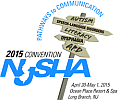Effects of Accented Speech on Speech Recognition in Middle-Aged Adults
Thursday, 11:00am to 1:00pm
Seabright
Poster 1
Purpose of this study was to evaluate middle-aged listeners' speech recognition of native and nonnative speakers of English, examine whether signal-to-babble ratio affects speech intelligibility of a nonnative accented speaker of English more than a native accented speaker of English, and to assess the effects of semantic context
Eight young and eight middle-aged adults with normal hearing listened to high predictability SPIN sentences with related and unrelated final words presented in noise and in quiet. Listeners wrote down the final word of each sentence. Participants also listened to conversational speech and a passage read by each speaker and completed comprehensibility and accentedness rating scales.
Results:Participants performed significantly better when listening to native accented speech than nonnative accented speech. For unrelated condition, there were significant interactions of accent by background, and of background by age group. In the related condition, a significant main effect was observed for accent (p<.001) and background, (p=.001) along with a significant accent by background (p= .002) interaction. No significant effects of age group were obtained for related sentences.
In conculusion, young adults performed better with nonnative accented speech than middle-aged listeners in the nonnative tasks which suggest middle aged listeners have more difficulty with nonnative speech. However, there was only a statistically significant age group difference in the unrelated condition. With unrelated sentences, young adults were more tolerant of background babble suggesting intelligibility of nonnative speech in noise without semantic context is a harder task for middle-aged listeners than it is for young adults.
Track:
Audiology
